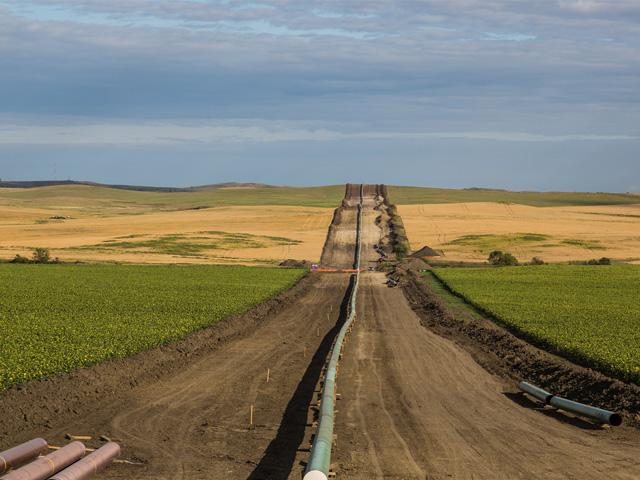Dakota Access Pipeline Lawsuit Dismissed
Judge Leaves Open Possibility of New Federal Action on Pipeline
LINCOLN, Neb. (DTN) -- A federal judge dismissed an ongoing lawsuit against the Dakota Access pipeline on Tuesday, leaving open the possibility for future litigation as the U.S. Army Corps of Engineers continues an environmental review of the pipeline.
The Corps of Engineers is providing monthly updates on the progress of its review, while pipeline operations remain open.
Agriculture groups have told federal courts a permanent shutdown of the pipeline would have devastating consequences for farmers, who would face increasing grain transport congestion as a result of more oil being transported by rail.
"The clerk shall terminate this matter, but plaintiffs may move to have it reopened in the event, for example, of a violation of the court's prior orders," U.S. District Judge James E. Boasberg said in brief issued in the U.S. District Court for the District of Columbia. "Plaintiffs shall file a separate action if they wish to challenge the forthcoming EIS (environmental impact statement), which action they may mark as related to this one so that it will be assigned to this court."
The court in May ruled the Dakota Access pipeline could remain open pending the ongoing review: https://www.dtnpf.com/….
P[L1] D[0x0] M[300x250] OOP[F] ADUNIT[] T[]
In January the U.S. Court of Appeals for the District of Columbia Circuit ruled Dakota Access violated the law by conducting work on the pipeline without an easement.
That case remains pending in the appeals court: https://www.dtnpf.com/…. Dakota Access LLC has requested an en banc hearing before the entire D.C. Circuit.
The Dakota Access pipeline was constructed underneath Lake Oahe, which was created when the Corps flooded thousands of acres of Sioux lands in the Dakotas by constructing the Oahe Dam on the Missouri River.
The lake provides several successor tribes of the Great Sioux Nation with water for drinking, industry and sacred cultural practices. According to the Mineral Leasing Act, the pipeline could not traverse the federally owned land at the Oahe crossing site without an easement from the Corps.
In December 2020, 14 states alleged in a brief the closing of the pipeline could hurt agricultural economies in the Midwest because of expected cost increases to ship grain.
In an amicus brief filed with the court, the states of Indiana, Montana, Iowa, Kansas, Kentucky, Louisiana, Missouri, Nebraska, Ohio, South Carolina, South Dakota, Utah, West Virginia and Wyoming sided with agriculture interests, the pipeline company and the Corps of Engineers.
From April 2016 to February 2017, Native American and other groups protested the construction of the pipeline running from the Bakken oil fields in western North Dakota and crossing the Missouri and Mississippi Rivers to southern Illinois.
Part of the pipeline runs near the Standing Rock Indian Reservation. Protests centered on concerns about the pipeline's effect on water supplies used for irrigation, drinking water and threats to ancient burial grounds.
The appeals court ruled the Corps violated environmental law in 2017 when it allowed the pipeline owner, Energy Transfer, to build beneath South Dakota's Lake Oahe.
Todd Neeley can be reached at todd.neeley@dtn.com
Follow him on Twitter @DTNeeley
(c) Copyright 2021 DTN, LLC. All rights reserved.




